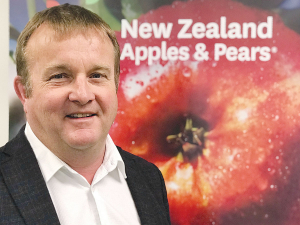2024–25 apple harvest exceeds expectations, says Apples and Pears NZ CEO
The 2024-25 season apple harvest has “well and truly exceeded expectations”, says Apples and Pears NZ chief executive Karen Morrish.
 NZ Apples and Pears’ Gary Jones believes the RSE scheme can help solve the apple picking crisis and housing issues in Hawke’s Bay.
NZ Apples and Pears’ Gary Jones believes the RSE scheme can help solve the apple picking crisis and housing issues in Hawke’s Bay.
Hawke's Bay's apple industry will spend $30 million on building accommodation totalling 1500 beds for RSE (recognised seasonal employment) workers.
The Government is yet to decide on approving 1000 extra RSE workers to help pick Hawke’s Bay’s $650 million apple crop in 2020.
The apple industry says it is meeting the Government’s challenge head-on, where RSE employers must show they can provide beds for the 5400 RSEs they need in Hawke’s Bay for next season.
New Zealand Apples and Pears manager of trade policy and strategy, Gary Jones, says the RSE scheme will solve the apple picking crisis and the housing crisis in Hawke’s Bay.
He says this season millions of dollars of apples were left rotting on the trees in Hawke’s Bay before the Government declared a seasonal labour shortage for the second consecutive year.
“We’ve listened and responded to the Government’s challenge,” Jones said.
“Together we’ve developed a partnership and we will work positively with the Government, in helping the region out of a housing crisis and growing our economy and export industry.”
The new RSE accommodation — estimated at $25,000 per bed — will be in new buildings and large scale ‘fit for purpose’ renovated buildings. About 1350 beds are consented and 400 more are in the pipeline.
The work will see almost all the 5400 RSE Hawke’s Bay workers housed by the industry. Rented houses will not be needed in urban areas.
Jones says the buildings will help to house “vulnerable New Zealanders” short term, and some will be offered apple industry jobs and a ride to work each day.
“The RSE scheme is [providing] fulltime employment and career pathways especially in new technology areas,” he said. “But we can’t grow jobs if millions of dollars of apples are left rotting on trees.”
Hawke's Bay is the largest apple and pear growing region in NZ.
Global dairy prices are on a roll, recording a fourth consecutive jump on the Global Dairy Trade (GDT) auction this year.
Booming primary sector exports are helping lift earnings for farm service providers.
The world is waking up to the disadvantages of carpets derived from petrochemicals, creating opportunities for New Zealand strong wool.
The red meat sector finds itself in "a very rare set of circumstances", says Federated Farmers meat and wool industry chair Richard Dawkins.
Agrisea NZ has appointed Craig Hudson as it's new chief growth officer.
State farmer Landcorp, trading as Pamu, is a forecasting a full-year net profit of around $100 million.

OPINION: Here w go: the election date is set for November 7 and the politicians are out of the gate…
OPINION: ECan data was released a few days ago showing Canterbury farmers have made “giant strides on environmental performance”.